New rules are in place to keep community helpers safe as the pandemic lingers
By LISA EISENHAUER
While she was sidelined from her volunteer duties at Flaget Memorial Hospital in Bardstown, Kentucky, last summer, Rita Carter experienced the hospital as a patient.
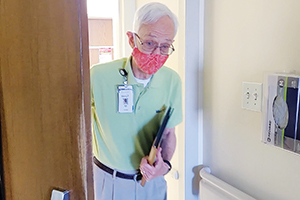
Bob Jewell enters a patient room at Mercy Hospital South in suburban St. Louis. Jewell volunteers as a patient representative at the hospital and a Eucharistic minister at its behavioral health center.
A 3-D mammogram revealed a cancerous lump and she underwent surgery and radiation therapy in the same cancer center where she has spent years restocking supplies for the nursing staff and escorting patients to chemotherapy rooms a couple of days a week. By January, testing showed no signs of cancer, proof to her that she had gotten the best of treatment.
"I just feel so fortunate that we have this excellent facility right here in town," Carter says.
Keeping the hospital in the community of about 14,000 open and thriving is one of her motivations for volunteering at the facility, part of CHI Saint Joseph Health, based in Lexington, Kentucky. The system is part of CommonSpirit Health.
She had no reservations about returning this spring when the health system reopened its doors to volunteers. "I feel really good about it," Carter says. "I feel like they're taking all the needed precautions."
Catholic hospitals and health systems across the nation are eagerly welcoming volunteers back as COVID-19 cases decline and vaccination rates rise. The helpers aren't being given all of their old assignments because of lingering fears of infection, but they are finding plenty of opportunities to share their time and talents.
Parking lot ministrations
As president of the CHI Saint Joseph Health Foundations that support CHI Saint Joseph Health, Leslie Smart coordinates the work of Carter and other volunteers who officially returned to the system's facilities on April 19. Smart says their assistance was dearly missed during the 407 days when they were kept off-site for their own safety.

Smart
Even when they weren't physically present, Smart says the volunteers kept up their good deeds. They sent notes of encouragement and dropped off food donations for hospital staff, knitted caps for newborns and sewed cloth masks for the community.
Some volunteers also assisted with a "parking lot ministry" for loved ones of patients who couldn't come inside hospitals because of pandemic precautions. The volunteers worked with chaplains providing spiritual care to would-be visitors waiting outside, handing out snacks and tiny prayer quilts with comforting messages and wooden hearts inside them.
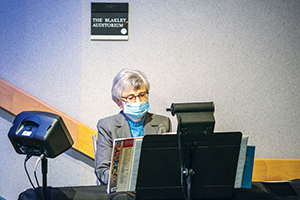
Janice Gold plays piano in the lobby of Saint Joseph Hospital in Lexington, Kentucky. Her husband, Tom, a retired pastor, also volunteers at the hospital. He assists the hospital's spiritual care team.
When the volunteers were allowed back into the hospital, Smart says the scene was emotional. She recalls her own greeting to one of them. "I said, 'You have no idea how much we've missed you,' and she said, 'Oh, you have no idea how much I've missed you.'"
Back in the saddle
Jane Thorpe volunteers with her friend Leslyn Randazzo at Mercy Hospital Lebanon in southwestern Missouri. She was so eager to get back on duty as a patient escort that she asked the hospital's volunteer coordinator every week when she could return.
"I missed the contact with people and the feeling you get when you help people," Thorpe says.
Randazzo says she was equally eager to return. "I needed to be doing something, especially in the winter, when I can't ride my horse," she says.
The friends are featured along with Bob Jewell, a volunteer at Mercy Hospital South in suburban St. Louis, in a video that the Mercy system released on April 15 to herald the return of its volunteers. Jewell spends several hours each week as a patient representative at the hospital and a Eucharistic minister at its behavioral health center.
"It's self-fulfilling," he says of his volunteer work. "There are so many rewards that you get by visiting patients and checking in on them."
Like Thorpe and Randazzo, he says he got a vaccination as soon as he could, so he'd be ready to return when Mercy called, although the system is not requiring volunteers to be vaccinated.
Drafting safety policies
Catherine Kroll, director of infection prevention for PeaceHealth, says that her system and others she has been consulting with on pandemic practices also are not requiring volunteers to be vaccinated. "We at PeaceHealth are strongly encouraging it, and we also are not using volunteers in any high-risk situations, such as with patients who are known or suspected to have COVID," she says.
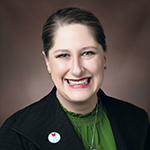
Kroll
Kroll is on a systemwide multidisciplinary committee that has developed policies for the safe return of volunteers. Her advice to the committee has been based on recommendations from the Centers for Disease Control and Prevention and other health agencies as well as on what she's learned about practices at other systems through her participation in two ongoing forums. One of those forums is facilitated by CHA.
"Those dialogues were really helpful for me while I figured out what our approach would be because there are no hard and fast CDC rules or guidelines around" the return of volunteers, she says.
In early May the Pacific Northwest, where PeaceHealth is based, appeared to be on the verge of another heavy bout with COVID. Kroll wasn't worried that the system might be putting volunteers at risk inside its hospitals. Even if some volunteers choose not to be vaccinated, precautions such as masks and plexiglass barriers should provide adequate protection from the virus, she says.
"Despite the fact that we're headed into this fourth wave of infections, I feel a lot more optimism and a lot calmer about how to keep people safe," she says. "And I have a lot fewer sleepless nights than I did a year ago."
If the incidence rate of the virus moves to what's considered a dangerous point in any of the communities where PeaceHealth operates, Kroll says the system would reevaluate volunteer activities.
Helping draft the policies for volunteer work has given Kroll a new appreciation for how integral their contributions are to the system. She was unaware, for example, that to qualify for certification with the Centers for Medicare & Medicaid Services, 5% of the staffing of hospice programs has to be by volunteers. That rule has been waived during the pandemic, but Kroll says it will go back into effect soon.
Riding the wave
Brett Kinman, administrator of CHRISTUS St. Michael Hospital – Atlanta, says volunteers are essential to keeping his 25-bed facility in east Texas connected to the community of about 5,500 people.
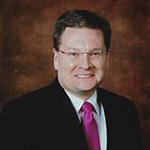
Kinman
He says he was beaming under his mask in early May when about two dozen of those volunteers showed up for an appreciation and welcome back luncheon.
"We reached our capacity to be in the room and socially distanced for the lunch. That was just really impressive," he says. "I think it goes back to our small community and the support that our local volunteers have for our facility and the mission of our organization."
He estimates that about 80% of the helpers who run its gift shop, greet people at the reception desk and perform other unpaid duties plan to return.
"As much as I'm super excited about them being there, long term I'm kind of worried about volunteer programs and how many people are going to volunteer with this extra little issue that's going to be in the back of their minds," Kinman says, alluding to lingering infection fears. "But right now, I want to ride the wave and enjoy having volunteers back in the building."
Cheers greet furry therapists' return to hospitals
After a year of being banished to the outdoors because of the COVID-19 pandemic, tails are wagging again inside Ascension St. Vincent facilities in and around Indianapolis.
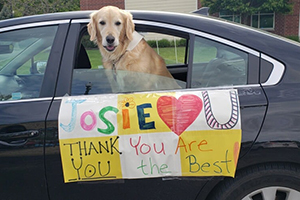
One of the therapy dogs with Paws & Think peers from a window during a car parade around the Ascension St. Vincent campus in Indianapolis in mid-May. The nonprofit has 24 therapy teams with a dog and their human who visit Ascension sites in and around the city. During most of the pandemic, their visits were outside or virtual.
Therapy dogs from the nonprofit Paws & Think this spring resumed their mission of lifting spirits by allowing the system's staff members to pet and hug them.
"There is so much scientific research that backs the benefits that this provides for people, including decreasing blood pressure and increasing all the good, happy endorphins that you get when you touch and interact with a dog," says Kelsey Burton, executive director of Paws & Think.
Her organization has 24 trained teams of one dog and its human who visit Ascension sites, including Peyton Manning Children's Hospital. As of mid-May, the teams were still not allowed in patient rooms. Kaitlin Knapp, manager of Ascension St. Vincent's healing arts program, hopes to reintroduce in-person patient visits soon. She says the hospital is following infection prevention recommendations from experts on the reintroduction of volunteers to patient-facing care.
In the meantime, patients can continue to watch videos of Paws & Think's furry volunteers on the system's closed-circuit TV channel and get personal virtual visits via iPad.
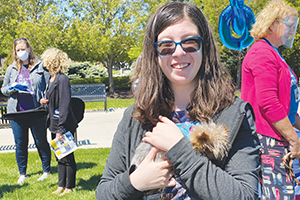
Ellie Sullenberger, 17, cradles a miniature Paws & Think therapist. She's grown close to the therapy dogs during her treatment for a brain tumor.
Paws & Think in May kicked off its 20th anniversary with a celebration outside the children's hospital. The event drew some of the patients, including Ellie Sullenberger. The 17-year-old has grown attached to the therapy dogs during her yearslong treatment for a brain tumor.
"Ellie is one of the dogs' biggest fans," Burton says. "She knows almost all of them by name."
Knapp says that when the canine therapy teams returned to hospitals to greet staff, their first scheduled stops were with the clinicians and other staffers who have been on the front lines of COVID care.
"We wanted to make sure that we were providing pet therapy to those associates who really went through it at the peak of COVID," she says.
Burton says hospital staffers cheered as the dogs returned. "One staff member said the thing they have missed most during COVID was the therapy dogs," she says. "It really just sort of solidified for us that what we're doing means a lot, not just to the patients, but that the staff need it just as much if not more sometimes."
— LISA EISENHAUER
Volunteers' contributions add up
Health systems say the value of volunteers' assistance is incalculable because it's not possible to put a monetary value on things like lifting the spirits of staffer and patients. Volunteer coordinator Leslie Smart offers some telling numbers for Lexington, Kentucky,-based CHI Saint Joseph Health, which includes 10 hospitals and is part of CommonSpirit Health.
- The system had about 470 volunteers prior to the pandemic and 325 have indicated that they will return.
- In fiscal year 2020, volunteers provided nearly 36,000 hours of service to the system. For assessment purposes, it values that service at $27 per hour.
- On average, volunteers' work hours provide the equivalent of $1.2 million in annual assistance.
- Volunteers raise funds for the hospital through various programs. Last year, that support totaled more than $100,000, a number that is consistent with past years.
— LISA EISENHAUER